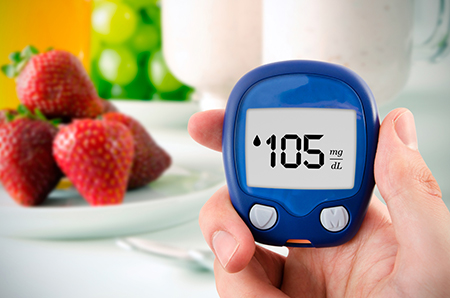What is Diabetes?
Diabetes is a disease that prevents the body from using insulin properly resulting in high sugar levels in the blood (called hyperglycemia). In type 1 diabetes the pancreas cannot make enough insulin and in type 2 diabetes the body cannot effectively utilize insulin, usually due to long-term exposure of the body to high levels of insulin. Type 2 diabetes, usually appearing in adulthood, is the most prevalent form, while type 1 diabetes generally develops in childhood or early adulthood. A diagnosis of diabetes will be confirmed with blood tests but symptoms of excessive thirst, frequent urination and insatiable hunger usually coincide with the disease.
Medications and Treatment
Type 2 diabetes can often be successfully controlled with oral medications, while type 1 diabetes will require insulin injections. Oral medications can cause side effects including stomach upset, weight gain, and hypoglycemia (low blood sugar). It is important to know and understand how to treat low blood sugar if it occurs. There are many different types of medications that work differently to treat diabetes, and it might be necessary for a patient to take several medications in order to manage their blood sugar levels. Additionally, other medications may be prescribed to help prevent heart and kidney disease in patients with diabetes.
Blood Sugar Testing
In order to determine if diabetes treatments are effective, testing the blood sugar with a blood sugar meter is important. Depending on the severity of the disease or the complexity of treatment, a doctor may recommend you testing once per day or up to three or four times per day. Testing the blood sugar involves only a small prick on the side of the finger that produces a tiny drop of blood. Blood sugar meters produce immediate results that are very useful in the management of diabetes.
Insulin Tips
Many different types of insulin exist in order to mimic how the body produces insulin in response to blood sugar spikes caused by eating or drinking. Long-acting insulin is usually given once per day while short acting insulin is given prior to meals. Insulin is available in multi-dose vials that require injections with traditional syringes or as pre-loaded pens that use a disposable pen needle. Insulin pens are a convenient option for patients on the go and are simple to operate. Insulin requires refrigeration before its first use but then can be kept at room temperature anywhere from 28 to 42 days depending on the product.
Living with Diabetes
Left untreated, diabetes can lead to major health problems like cardiovascular disease, kidney disease, vision loss, nerve damage and diabetic coma. Medications are vital in managing diabetes but lifestyle modifications, like diet and exercise, are also essential. Limiting dietary intake of sugar is foundational to a diabetes management plan. Not all sugars are created equally so learning which foods to eat and which to avoid can be a challenge. Education is key in effectively managing diabetes.
Eating with Diabetes: Prioritize Carbohydrates While Learning to Eat Well
The place to start when learning to eat with diabetes is in knowing the three major nutrient groups and how they affect your health. Read More.
